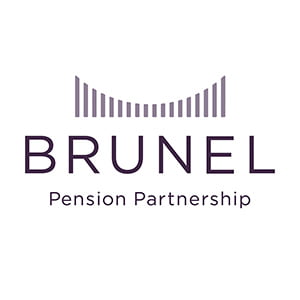
Brunel Pension Partnership
Brunel Pension Partnership is one of eight UK Local Government Pension Scheme pools, bringing together investments of ten like-minded funds: Avon, Buckinghamshire, Cornwall, Devon, Dorset, the Environment Agency, Gloucestershire, Oxfordshire, Somerset and Wiltshire.
Portfolio level
Portfolio level – Portfolio decarbonisation reference target
Baseline date: 31/12/2019 for listed equity
New portfolios may adopt a more appropriate baseline e.g. 31/12/2020
Baseline performance: 343 tCO2e/mGBPTarget year(s): Annual; 2022; 2030
Target(s):
Annual: At least 7% per annum reduction in weighted average carbon intensity (scope 1,2 and first tier scope 3) for each portfolio compared to its investable universe (benchmark).
2022: At least 20% reduction in weighted average carbon intensity.
2030: At least 50% reduction in weighted average carbon intensity (scope 1 and 2), for each portfolio compared to its investable universe (benchmark).
GHG scopes included: Scope 1 and 2 emissions are included in the annual target and 2030 target. First tier scope 3 emissions are included in the annual emissions reduction target for listed equity portfolios for 2022.
Asset classes in scope: Listed equity (when the target was set, listed equity represented around 88% of Brunel’s AUM).
The 2030 target covers listed equity and corporate bonds.
Methodology/ net zero scenarios: At least 7% on average per annum: in line with or beyond the decarbonisation trajectory from the IPCC’s 1.5°C scenario (with no or limited overshoot).
As a next step, Brunel will establish other data points, metrics and targets in line with the Net Zero Investment Framework and other regulatory asks.
Emissions metrics: As Brunel has doubled its asset base since 2019, interim emissions intensity targets were deemed more appropriate.
Portfolio level – Investment in climate solutions target
Qualitative goal: Brunel has a strong commitment to increase investment in climate solutions, as evidenced by the huge amount investment. However, as Brunel does not
control strategic asset allocation, a quantitative target has not been set outside of those within specific thematic portfolios e.g. renewable energy infrastructure.
Methodology: We are also seeking to establish a baseline of green revenues from within the listed equity portfolios as at 31/12/2021. This work is underway with the external support of FTSE Russell and should provide some analysis for each of the listed equities portfolios, from which we aim to extrapolate client exposures.
We are then looking to see how we can map private market investments to the same
categories, although this will be on committed capital basis.
Asset level
Asset level – Portfolio coverage target
Baseline: Brunel is working on establishing a baseline as of 31/12/2021 for material sectors.
Target(s): Brunel aims to set targets in the updated climate policy in January 2023. Currently, Brunel is targeting all our material holdings to be at TPI level 4 or above by 2022.
Asset classes covered: The targets will cover listed equity initially (~88% of the portfolio) with an objective to expand this to other asset classes over time.
Methodology: For material sectors covered by TPI carbon performance data, Brunel uses this quantitative analysis to provide portfolio analysis. This can be applied to both index (passive) and active portfolios. We have a 1.5C° scenario for electric utilities, oil & gas and mining. Other sectors will need to use scenarios we have available which may be below 2C°.
We also plan to analyse all holdings in active listed equity.
We intend to work with our managers to establish a current baseline of alignment, using a blend of quantitative and qualitative and using multiple methodologies. There will be a large number of unknown as what constitutes alignment, as in less impactful sectors, this has not been defined.
Asset level – Engagement threshold target
Baseline: Current proportion of finance emissions engaged on is 47.3%
Target: The near-term target set in the Net Zero Investment Framework is 70%, increasing
to 90%. We anticipate that these will be our target.
Approach: Brunel carries out engagement with material holdings to persuade them to advance at least one level (up to 4*) per year against the TPI Management Quality framework.
Additional information
Methodology: At least 7% on average per annum emissions reduction is in line with the decarbonisation trajectory from the IPCC’s 1.5°C scenario (with no or limited overshoot).
Operational emissions: Brunel has committed to be net zero in its operational (scope 1 and 2) emissions and made considerable progress in measuring and reducing its scope 3 emissions by 2030.
Annual Report & Financial Statements (March 2022; pages 21-25); Climate Change Action Plan Report (2021); Carbon Metrics Report (2021); Climate Change Policy 2023-2030.
Brunel Pension Partnership case studies